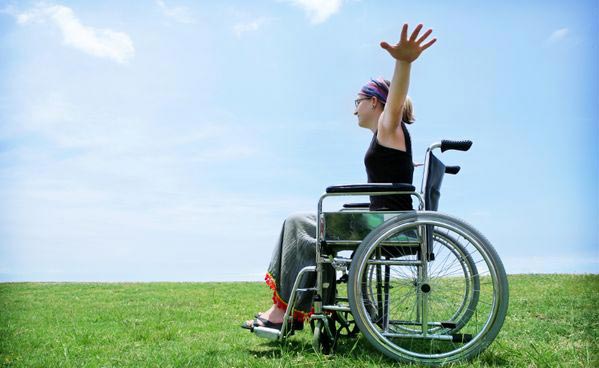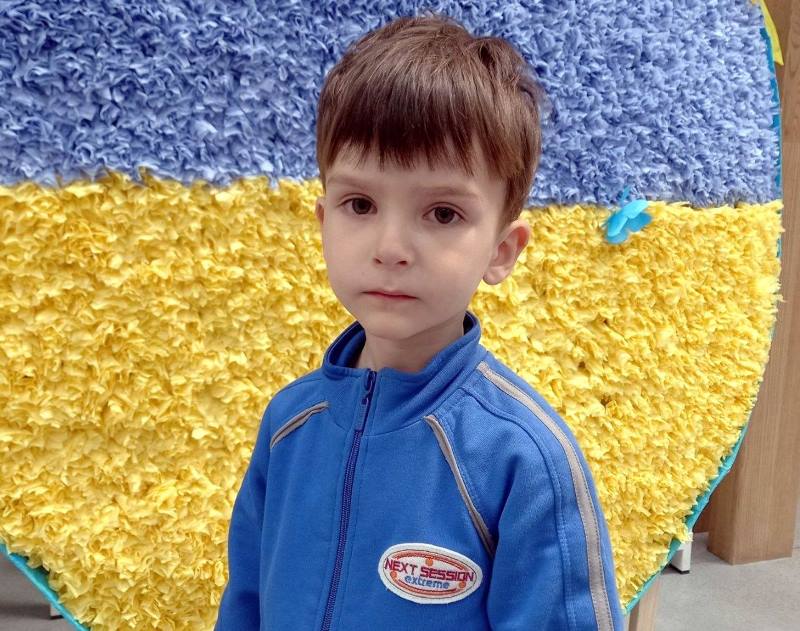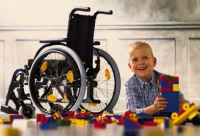
It turned out to be almost impossible to meet a person with any visible signs of disability on Ukrainian streets. There was nothing left for me to do, but contact a large number of special institutions for disabled people or search for someone whoвАЩd agree for a short interview.
This immediately raised a question: вАЬWhy can one rarely see a person with special needs on the streets of our Ukrainian cities?вАЭ According to official state statistics, there are around 3 million of such вАЬspecialвАЭ people in Ukraine, approximately 158,000 of whom are children. The absence of people with disabilities in our society is not accidental, but is caused by a number of complicated reasons I tried to investigate while writing this material.
Here is a list of some common problems faced by disabled people in Ukraine. The list is based on my interviews with families who have children with special needs and also on the state research conducted by the Ukrainian National Institute of Human Development in 2009.
1. Financial Difficulties. This often means abject poverty, which is experienced by many Ukrainians nowadays. Disability grants fall far short of covering the cost of rehabilitation or even simple everyday life expenses. For instance, a typical person with a disability receives from the government around 1,000 hryvnyas per month (thatвАЩs around 124 US dollars). Clearly, with such little money one can hardly afford a course of rehabilitation massage that costs 200 hryvnyas (24 US dollars).
2. Health Care, Rehabilitation, Sport. There are, in fact, no rehabilitation or sports clubs for people with disabilities in Zaporizhzhia. Moreover, the city has a great lack of experienced rehabilitation coaches. And to top it all, Ukrainian rehabilitation prices are simply sky-high. For example, an average rehabilitation course for people with physical disabilities costs around 20,000 hryvnyas (thatвАЩs around 2,486 US dollars). ItвАЩs necessary to take at least two such courses a year (Read вАЬFinancial DifficultiesвАЭ point above). Ukrainian sports fans with special needs can never really attend any sports events because the seats cannot accommodate wheelchairs.
3. Free movement issue. Our city is totally inaccessible for any wheelchair users or visually-impaired people. ItвАЩs sad to admit, but the cityвАЩs ramps and other special facilities are meant for вАЬself-murderersвАЭ since they have no handrails and incline at improper angles. While there are some ramps at supermarkets and in front of the regional state administration building, none exist at such essentially important places as hospitals, district executive committees and social security departments. A disabled person is often not able to leave his\her home to have a little stroll due to the lack of ramps. There are just a few traffic lights that вАЬcan speakвАЭ for visually-impaired citizens of our city.
HereвАЩs a short interview with a girl in a wheelchair: вАЬIвАЩd be pleased to go out to a club, but thereвАЩs a problem of getting there. And another issue: When I was at a health resort, I met a young guy who also uses a wheelchair. Now we dream of meeting each other. Does your organization have any volunteer groups that would assist us, people in wheelchairs with travelling around, even a paid service? I feel utterly confused: it looks like I can only enjoy independence at a health resort, but I cannot financially afford it. And coming back home I am not even able to go anywhere outside my flat unaidedвА¶вАЭ
The whole civilized world solves this issue by means of social taxi services. This means comparatively cheap transportation service for people with special needs. Although some Ukrainian cities already provide such services, Zaporizhzhia doesnвАЩt do it yet.
4. Education. There are some discussions about studies comparing children with disabilities to their healthy peers. Unfortunately, this discussion has not brought any results yet: there are no experienced teachers or special learning programs and parents of healthy children are not ready for such a system. However, thereвАЩs a positive tendency of involving disabled children in different school events, parties, state and charity activities.
As a student of the sociological faculty said, вАЬPeople often ask me if I can fulfill my professional needs in a wheelchair. IвАЩm not quite sure how I will work after the graduation, but I love my studies. ItвАЩs not so easy to study at a correspondent department, but I am not able to attend the university every day. There are no ramps or lifts at my university. One of my teachers even had to carry me in his arms. ItвАЩd be great if I could have some additional English classes at home. People with disabilities spend most of their time at home and they feel like theyвАЩre in a vacuum. They long for communication. IвАЩd also like to be a volunteerвАЭ.
"ThereвАЩs an example from a world practice of the mutual (so called inclusive education) studies of people with different abilities. In the USA and Israel, students help their classmates with special needs as volunteer-tutors. This volunteer system enables several problems to be solved at once: students with disability adapt themselves to a new environment more easily and their healthy classmates also get used to the fact that some people are different. IвАЩd like to stress the fact that our government would save a great deal of its budget and many social workers if this volunteer system were implemented in Ukraine. Universities with such a volunteer system support students with special needs. In Israel, student-volunteers can get some studies discounts and in the USA they can even pass some of their exams automatically. However, many such volunteers do not take advantage of their volunteer activities since they believe that helping other people is not a great dealвАЭ (From the Moscow City Psychological-Pedagogical University Conference, 2010).
All socially-oriented countries realize that with an education a disabled person can actively take part in social life and even bring some benefits to the state. One should not underestimate the great potential of people with disabilities.
5. Psychological support of families with disabled children. There is a real shortage of available special centers and experts to provide psychological help to families who have disabled children.
6. Cultural Life and Hobbies. There are many different amateur clubs in our city, but they are not adapted to people with special needs. Basically, all the cinemas, philharmonics and night clubs are not available to wheelchair users in Zaporizhzhia. The same state of things is with other types of disability. There are no facilities for visually or hearing impaired people and thatвАЩs why they cannot live independently. The cultural situation gets much worse in remote villages.
7. Social Isolation. Loneliness or a jail sentence is the worst punishment for any human being. There are many вАЬinnocentвАЭ prisoners in our city. The lack of communication and compassion has an especially bad impact on a person, causing depression and a bad mood on the top of their existing health problems. The only available channel of communication is the Internet, but itвАЩs no substitute for real-life communication.
The disability issue is not that new. World history illustrates many different ways disabled people were treated: from a total extermination of disabled people, their isolation вАУ to the recognition of accepting people with special needs in society. The most radical examples of disability issues are closely connected with cruel societal customs. In Sparta, babies born with disabilities were simply cast away. In Nazi Germany, people with mental disabilities were systematically eliminated in concentration camps. The understanding that societal development depends on its humanization was gradually growing. The renunciation of discrimination against people with disabilities was the start of inclusive education and social integration.
Inclusion is the act of including all members of society into an active social life that involves the acceptance of all people regardless of their physical or mental abilities as well as giving them the right to work and study.
How we can help: we should dramatically change our attitude towards disabled people. That means we should stop being afraid of disabilities or feeling pity towards disabled people. We should stop trying to вАЬpleaseвАЭ them once in a while. Even the use of an incorrect word or term may cause emotional discomfort to people with special needs. If one takes the first step, one can immediately notice that nothing can be an obstacle to true friendship and all those so-called limits are just old stereotypes. Most people with disabilities try to live like the rest of the people on our planet: they work and earn a living, they seek to fulfill themselves through careers and arts, and they get married and become parents. A disability does not mean a DISabled person, but rather a way of life in some specific circumstances.
A great part of solving the social problems faced by disabled people goes beyond special programs like treatment or professional education. The effectiveness of the solution depends on the attitude of ordinary members of our society towards this issue.
The solution will require some time, tremendous effort and optimism. No king or hero can do it, вАУ only we with GodвАЩs help. Many developed countries have faced long periods of social crisis, but their experiences show that people representing themselves in different public movements and charitable organizations can make a change. The main condition of this process is the acceptance by the social consciousness of the idea of equal rights and opportunities for all the people and attitude change towards people with special needs.




